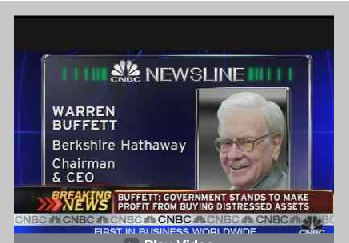As most of you are probably experiencing yourselves, the hot topic of conversation everywhere (work, home, the gym, etc.) is the banking and financial crisis. That means that most people who pay little to no attention to the markets are suddenly immersed in the subject and playing big time catch up.
The one question I get more than most is “what does leverage / deleveraging mean”? To avoid repeating myself, I’ve provided a layman’s explanation of the process from beginning to end.
THE QUICK ANSWER – HOW THE CREDIT CRISIS BEGAN
PART 1
There are two parts to this answer. First, you have to understand that leverage initiated the process. Specifically, institutions would use just $1 to buy $20 or $30 worth of assets and borrow the rest.
 To put that into perspective, imagine if Bob The Banker allowed you to use your $100,000 down payment to buy a $2,000,000 or even $3,000,000 asset. ($100,000 x 30)
To put that into perspective, imagine if Bob The Banker allowed you to use your $100,000 down payment to buy a $2,000,000 or even $3,000,000 asset. ($100,000 x 30)
“AWESOME!” right? Bob is your new best friend forever (BFF Banker Bob) because you can live like a rock star and accumulate assets like a big wheel without putting down much cash.
It gets even better when good times are rolling. If your $3,000,000 asset appreciates by 10% to $3,300,000, you just made $300,000 on a $100,000 investment (minus interest payments for the year).
This is so easy that you actually re-finance that asset to pull out the $300,000 and use it to buy a $9,000,000 house $300,000 x 30). Now you’re living like a rock star, accumulating assets and generating returns that shame Warren Buffet into crossing the street when he sees you coming.
BFF Banker Bob can’t finance your purchases fast enough. He doesn’t need any cash from you. He just keeps refinancing your appreciating assets and using the “profit” to buy more assets. You are highly leveraged.
PART 2
Unfortunately, all things too good to be true must come to an end. In the markets, prices do not appreciate forever. At some point, buying either slows down and assets start dropping in price OR people start selling assets to put cash in their pocket, which also leads to assets dropping in price. The price drops usually start out as minor but – like a domino effect – turn into major price drops. Don’t worry about further explanation, just accept this as fact.
In this case, your $3,000,000 asset that appreciated to $3,300,000 has now dropped to $2,700,000. This is still a good price and not an unreasonable correction from it’s original price (a small drop) – but you were so highly leveraged that even a small correction to the market put you in a negative equity situation where:
- The mortgage is now greater than the asset
- You don’t have any cash because you used it to keep buying other assets.
 BFF Banker Bob “loves ya’ baby” but needs to keep his job and needs you to either come up with the cash or sell all of your assets fast. No ifs, no buts, no rock star status and Warren Buffet is suddenly walking back on your side of the street again.
BFF Banker Bob “loves ya’ baby” but needs to keep his job and needs you to either come up with the cash or sell all of your assets fast. No ifs, no buts, no rock star status and Warren Buffet is suddenly walking back on your side of the street again.
You don’t have the cash. BFF Banker Bob can’t sell your assets fast enough. You are deleveraging.
As he sells your assets and causes prices to further correct (small corrections), the result begins to effect people other people that were highly leveraged. The market is deleveraging.
THE QUICK ANSWER – INSTITUTIONAL EXAMPLE
The experience of an investment bank isn’t much different except for two things. First, you could never get 30X leverage on your money but institutions can. Second, they’ve done it to the tune of TRILLIONS OF DOLLARS. As such, when they begin to deleverage they create a massive domino effect that trickles all the way down to everyday people like you and me. Suddenly, despite the fact we made our mortgage payments on time and acted financially responsible, our home values have dropped 20, 30, 40% making us suddenly feel poorer than we are.
THE QUICK ANSWER -CREDIT CRISIS
At the same time banks are deleveraging, they are also refusing to lend money out to anybody but the highest rated borrowers. Want to buy a house? You better have a 30% deposit and a stellar credit rating. This creates a credit crisis because people and businesses suddenly can’t get loans to continue financing their existence / operations.
On the other hand, people with sufficient credit status are watching this domino effect and putting a hold on all purchases in hopes of buying stuff much cheaper months from now. Banks are doing the exact same thing. This standoff means the economy grinds to a halt.
THE QUICK ANSWER – GOVERNMENT BAILOUT
The proposed $700 Billion bailout is not for the purposes of putting money into the pockets of poor Wall Street bankers. Rather, it is meant to be a catalyst by beginning to buy assets – even at really low prices. If the government can set a “floor” price on assets, the standoff should end as buyers realize assets can’t get much cheaper and want to begin buying them before the government gets their hands on all of them.
Will it work? Not sure. Nobody knows. But at least you now understand the path that brought us here and the plan to get us out.
I trust the above to be satisfactory but if you are now looking for a more thorough but concise discussion, have a look at this article.
Regards,
George







 To put that into perspective, imagine if Bob The Banker allowed you to use your $100,000 down payment to buy a $2,000,000 or even $3,000,000 asset. ($100,000 x 30)
To put that into perspective, imagine if Bob The Banker allowed you to use your $100,000 down payment to buy a $2,000,000 or even $3,000,000 asset. ($100,000 x 30) BFF Banker Bob “loves ya’ baby” but needs to keep his job and needs you to either come up with the cash or sell all of your assets fast. No ifs, no buts, no rock star status and Warren Buffet is suddenly walking back on your side of the street again.
BFF Banker Bob “loves ya’ baby” but needs to keep his job and needs you to either come up with the cash or sell all of your assets fast. No ifs, no buts, no rock star status and Warren Buffet is suddenly walking back on your side of the street again.